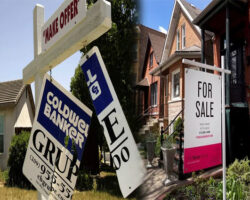How long can prices rise before no one can afford to buy? In a nutshell, that is the basic question that is niggling at the back of our collective subconscious when we talk about the real estate bubble.
Real estate is appreciating at staggering rates – as much as 19{823ee7c0eba0898fb29b07c380fe9d57eedb27ae7904b52342d0b3a1c98ef280} in some counties in Florida according to state officials. Meanwhile, on the financing scene, interest rates are low – and staying there. Low interest rates mean lower monthly mortgage payments – which means that many people are able to borrow MORE and afford larger mortgages and more expensive houses. Couple the astronomical increase in real estate value with the continuing trend of low interest rates, and you have a sizzling hot real estate market that just keeps getting hotter as investors jump on board to get their piece of the real estate pie.
Which leads people who know finances and the market to question how long it can last. A major part of that answer is in the question that opened this article. Prices will continue to rise until they reach the point where most people can no longer afford to buy.
Another part of the answer is in the fact that the real estate bubble is extremely localized – and it’s localized in some of the larger media centers around the country. Massachusetts, New York, Florida, California – those states are seeing unprecedented rises in housing and real estate prices. According to national reports, the median price for a home in the United States rose 14.7{823ee7c0eba0898fb29b07c380fe9d57eedb27ae7904b52342d0b3a1c98ef280} over the last twelve months. That percentage is deceiving though. Take a look at some more local figures to get a clearer look at the reality.
If you live in Nevada, the median price of a home rose 31.2 percent. In California, home appreciation rose up 25.4. In Hawaii, the figure was 24.4 percent, in Washington, D.C., 22.2 percent and in Florida up 21.4 percent. Most of the rest of the country is NOT seeing those sorts of astronomical increases in value, though. If you’re buying in Mississippi, for instance, home prices have appreciated at a more reasonable 4.9{823ee7c0eba0898fb29b07c380fe9d57eedb27ae7904b52342d0b3a1c98ef280}. Even in the Northeast, where a two bedroom home in Boston can easily sell for $400,000, if you take a short drive outside the city to the western half of the state, you’ll still find 3 and 4 bedroom homes selling in the low $100’s – and less.
What’s it all mean? Among other things, it means that the dangers of a real estate ‘crash’ are as localized as the effects of the real estate bubble. It means that the foreseen losses are more likely to be smaller profits rather than actual losses. To quote a Florida economist, “The people who think it’s a big bubble see a big crash. We just see deceleration. You don’t have to worry about house prices going down.”
The bad news may be for those who see real estate as a get-rich-quick proposition. One of the most popular investment ‘schemes’ of recent years has been ‘flipping houses’ – the practice of buying a house, then reselling it within a six to twelve months for a profit. When real estate prices are rising at 20 – 30{823ee7c0eba0898fb29b07c380fe9d57eedb27ae7904b52342d0b3a1c98ef280} per year, there’s a great deal of money to be made that way. A down payment of $10,000 can effectively double or triple your money in less than a year. According to conservative estimates, though, real estate prices need to rise by at least 15{823ee7c0eba0898fb29b07c380fe9d57eedb27ae7904b52342d0b3a1c98ef280} a year to even cover your closing costs if you sell in less than a year.
Does that mean that you’ll LOSE money on your purchase if real estate prices stabilize and drop back to their more usual 5 – 8{823ee7c0eba0898fb29b07c380fe9d57eedb27ae7904b52342d0b3a1c98ef280} per year rise? Of course not! It simply means that real estate goes back to being what it has always been – a good, solid, long-term investment. It means that speculators looking to make a quick buck will have to re-adjust their expectations – and either find a different ‘product’ – or hold their properties longer before selling.
Either option is good news for the ‘classic’ real estate investor, or the average home buyer who is looking for an affordable house for himself and his family. Prices will stabilize and even drop a little – but the bottom won’t fall out of the real estate market. The typical real estate owner/investor will still end up with a house and land that’s worth more than what he paid for it. And all the naysayers and panic mongers can stop predicting the resounding crash of the real estate bubble falling to earth.

